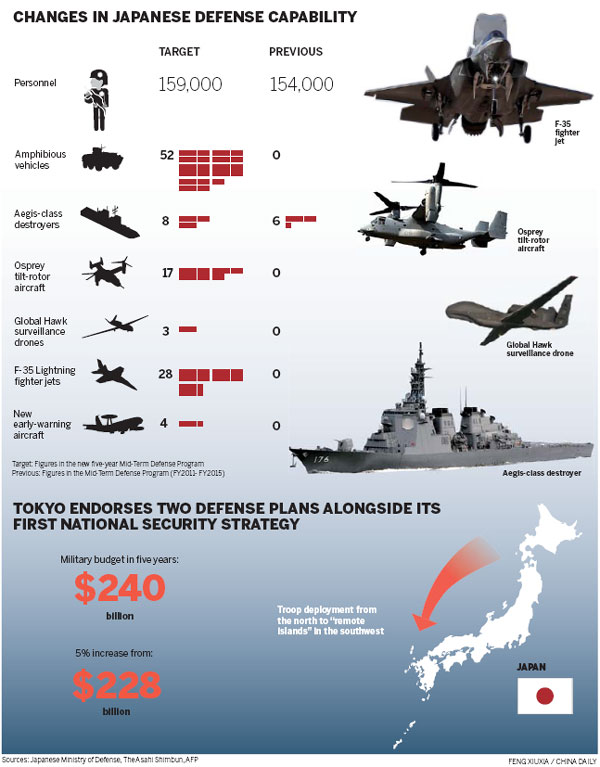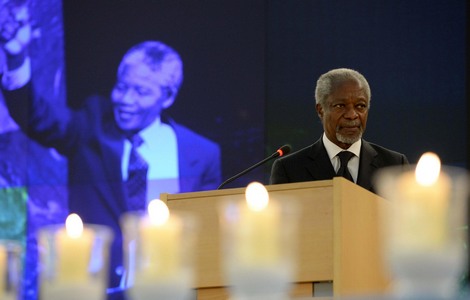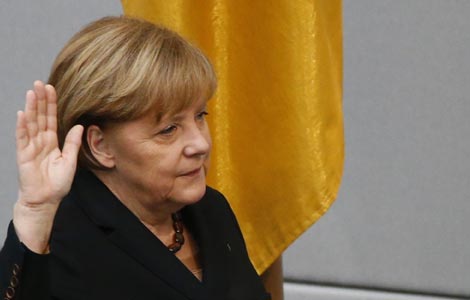

Revised strategy, more funding flouts pacifist Constitution, experts say.
The defense policy package that Japan's Cabinet approved on Tuesday represents a comprehensive change in Japan's military approach and is a major departure from the country's pacifist stance since World War II, international media and Chinese experts said.?
"Abe has used the timing of frozen ties with China to pass legal documents that enable the country to become a major military power," said Ruan Zongze, vice-president of the China Institute of International Studies, referring to Japanese Prime Minister Shinzo Abe.

Tokyo is trying to "do all the things it wants" at the moment, and the documents will guide its military buildup in the long term, he said.
Japan's Cabinet on Tuesday adopted a national security strategy and revised two defense plans — one long-term, and one focusing on the period from 2014 to 2018 that increases defense spending by 5 percent, citing "threats" from China related to the territorial row over the Diaoyu Islands.
"The Self-Defense Forces will develop full amphibious capability in order to land, recapture and secure without delay in case of any invasion of any remote islands," the national defense program guidelines said.
Based on the strategy, Japan will create its first "amphibious" unit, similar to the US Marines, as part of its ground defense forces.
More over, during the five-year period, Japan plans to buy three drones (likely the Global Hawk), 52 amphibious vehicles, 17 Osprey hybrid helicopters and five submarines.
The spending will also encompass two destroyers equipped with the Aegis anti-missile system and 28 new F-35 fighter jets — a stealth plane far superior to the F-15 that Japan currently uses.
The five-year defense program asks for about 24.67 trillion yen ($240 billion) to pay for the buildup.
The documents also said Japan will revise its principles that restrict the transfer of arms and military technology to some countries to "fit the new security environment".
The policy package came with the establishment of a US-style National Security Council that is expected to concentrate greater power in the hands of a smaller number of senior politicians and bureaucrats.
Abe said the shift will allow Japan's military to better shoulder its responsibilities on the global stage through what he has promoted as "proactive pacifism".
But The New York Times said in a report on Dec 11 that the new strategy "offered a glimpse of how far Japan has come from a firmly pacifist nation that just two decades ago was still reluctant to admit it had even a limited military".
The Associated Press said on Tuesday that "Japan's neighbors — and some Japanese citizens — worry that the guidelines push the country away from its pacifist Constitution".
AFP quoted analysts as saying that much of the weaponry Japan intends to purchase will replace obsolete equipment, but "the shift in military priorities is evident".
Ruan from the China Institute of International Studies said Japan will not stop at the three documents.
"Next, Japan will try to change its government's conventional interpretation of exercising the right of self-defense. By doing so, Tokyo will become an unstable factor in the region."
Reuters said in an analysis on Saturday that "lifting Japan's self-imposed ban on exercising the right of collective self-defense would mark a major turning point for Japan's postwar security policy".
"Abe's high popularity ratings have been a key factor in silencing potential critics in the ruling bloc. Critics have said lifting the ban is more likely to mean Japan gets involved in armed conflicts overseas that put Japanese lives at risk," Reuters said.
Jiang Ruiping, a Japanese-studies expert and vice-president of China Foreign Affairs University, said "there has been a vicious circle among Japan's politicians, political parties and entire society that is pushing the country further" toward rightists leadership.
"It will greatly affect the order in East Asia and hamper regional cooperation," he said.
He also said that the term "restricted" defense powers carried by old versions of Japan's defense guidelines did not appear in the new version.
In addition, Jiang said, the moves are apparently targeted at China, moving the center of Japan's military implementation to the south and the west.
Lyu Yaodong, director of the Japanese diplomacy department of the Institute of Japan Studies under the Chinese Academy of Social Sciences, said the three documents sensationalized "threats" from China to "prepare for the way for Japan to become a major military country with important international influence to realize Abe's political ideal".
Contact the writers at lixiaokun@chinadaily.com.cn and caihong@chinadaily.com.cn
Mo Jingxi in Beijing, AFP and AP contributed to this story.







